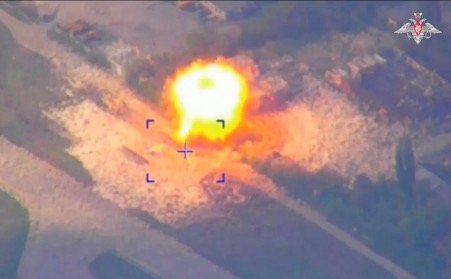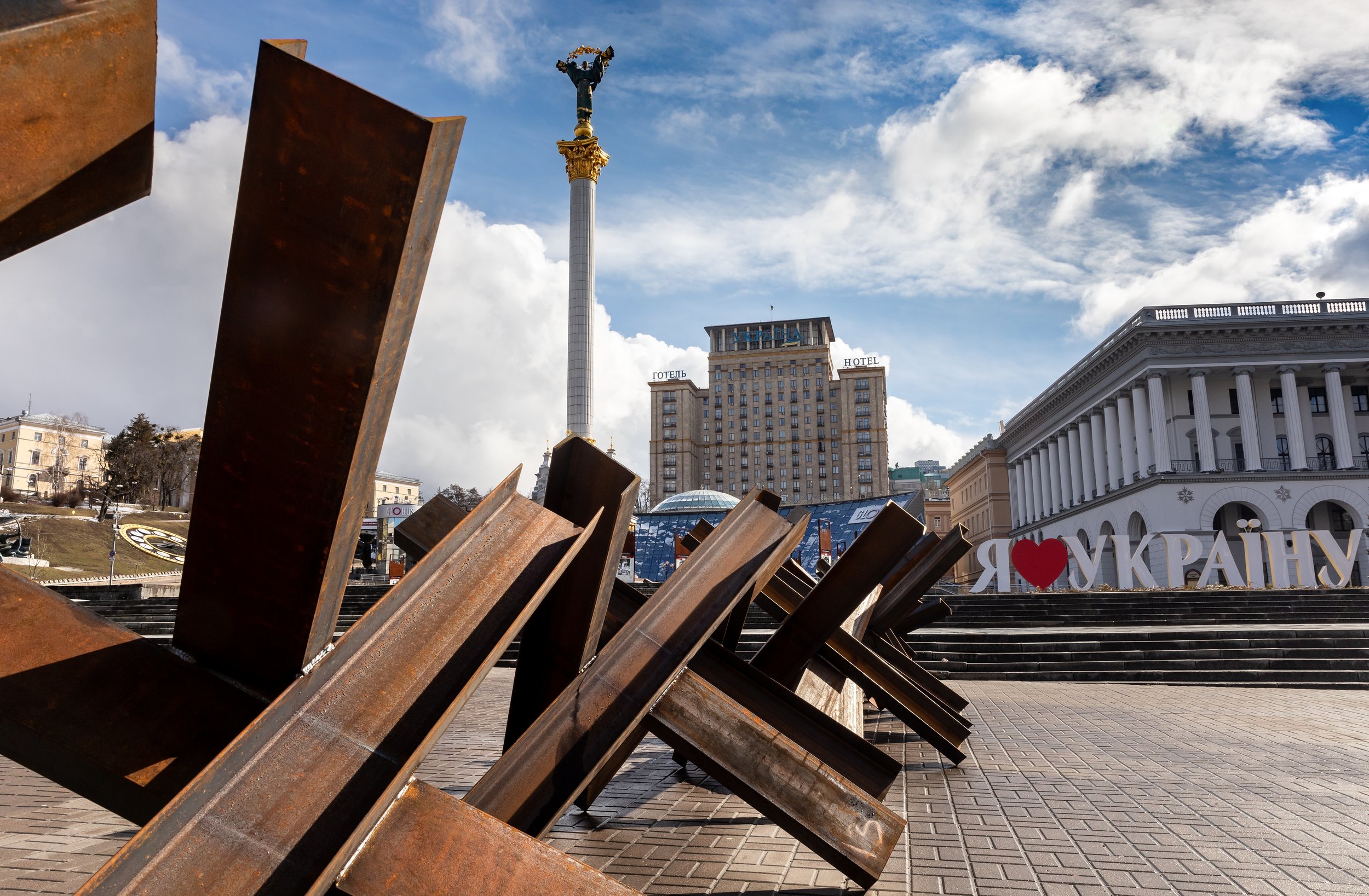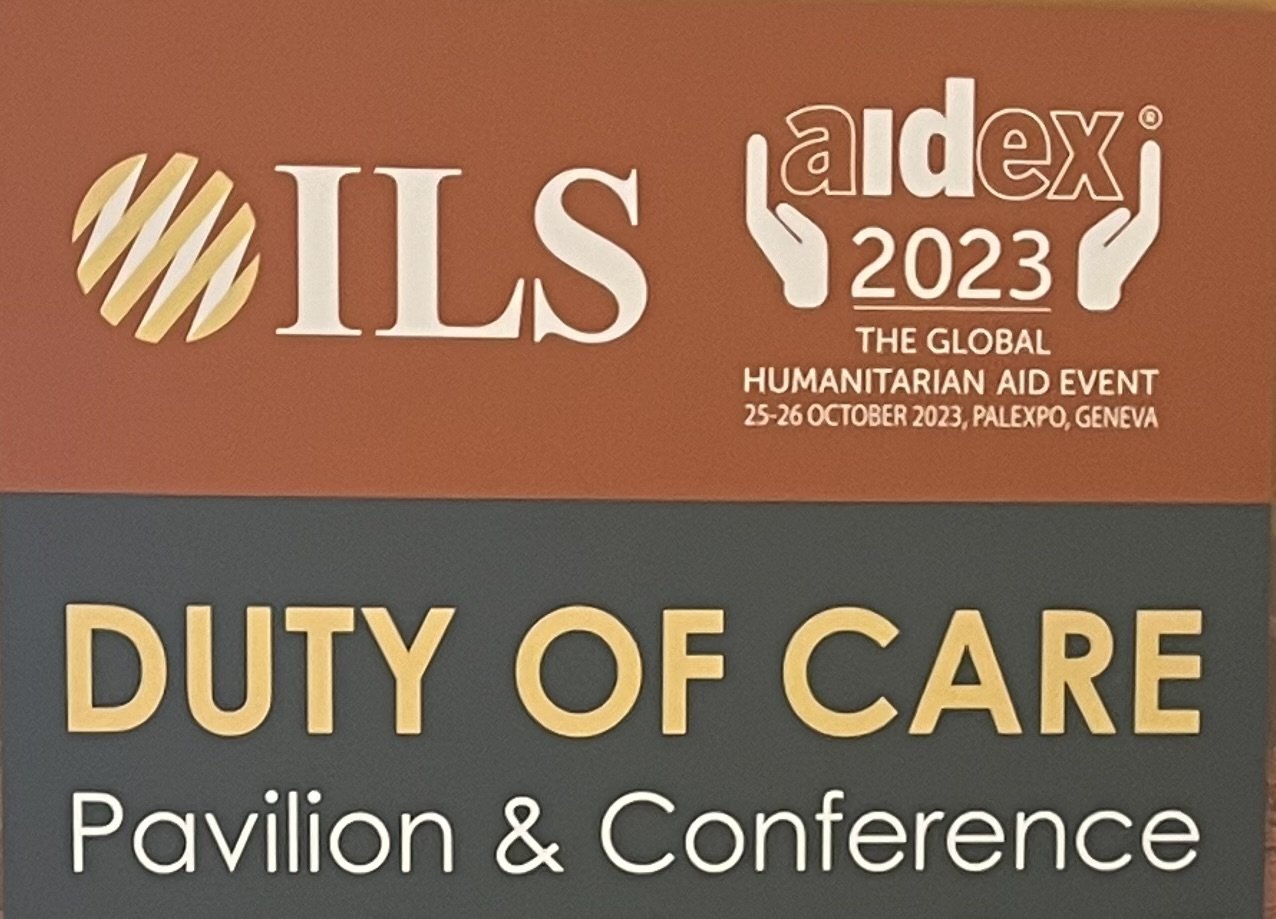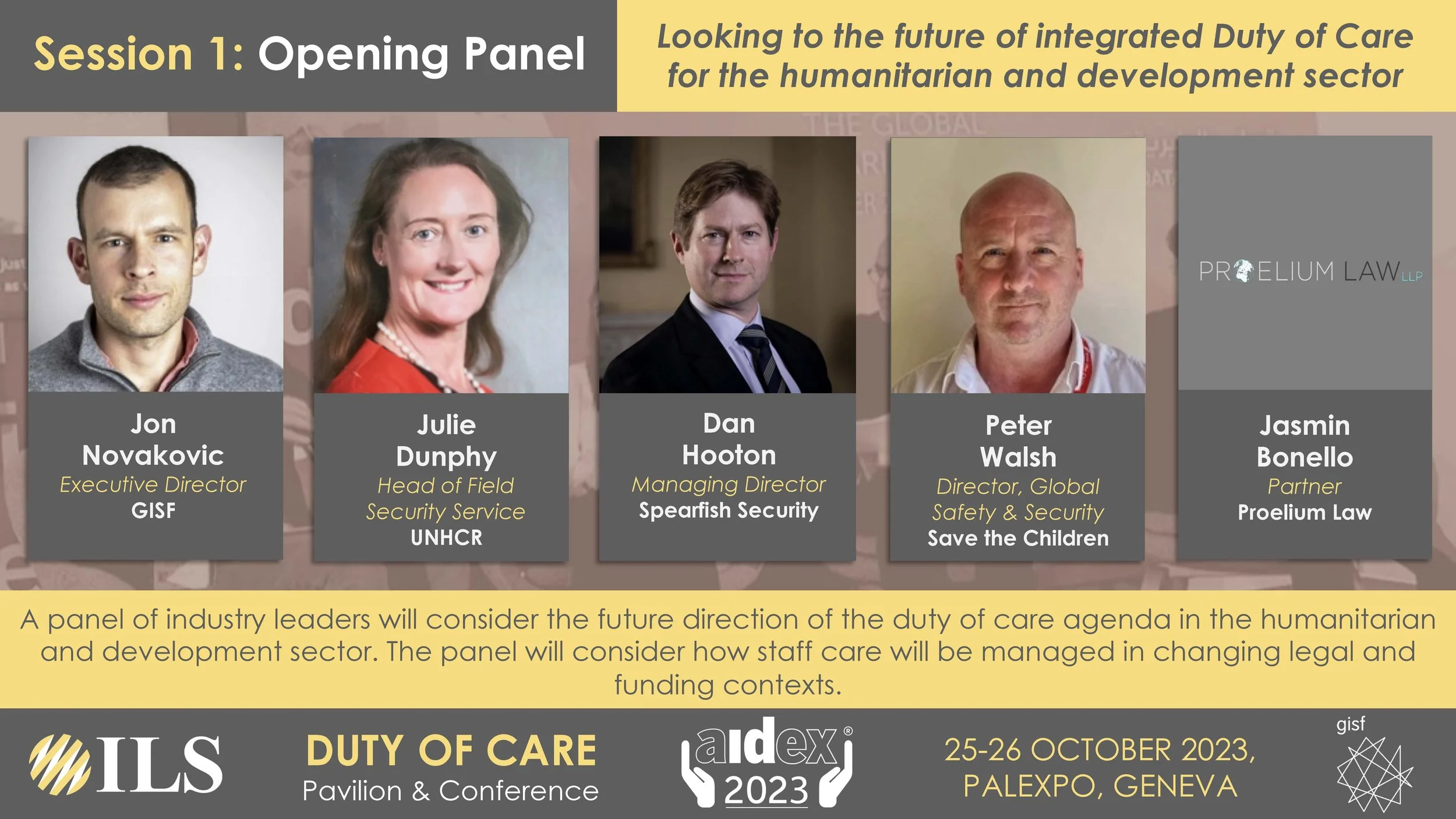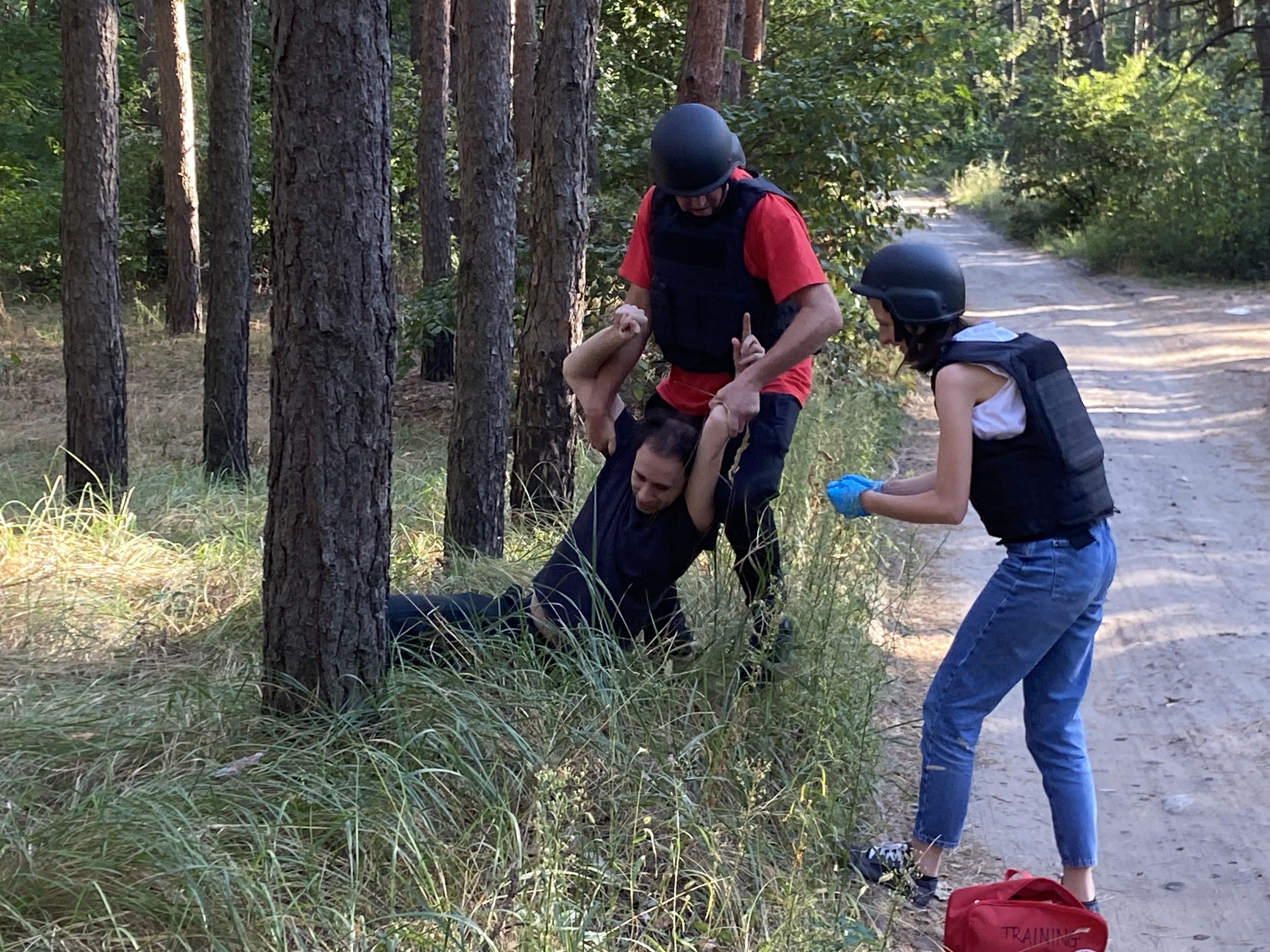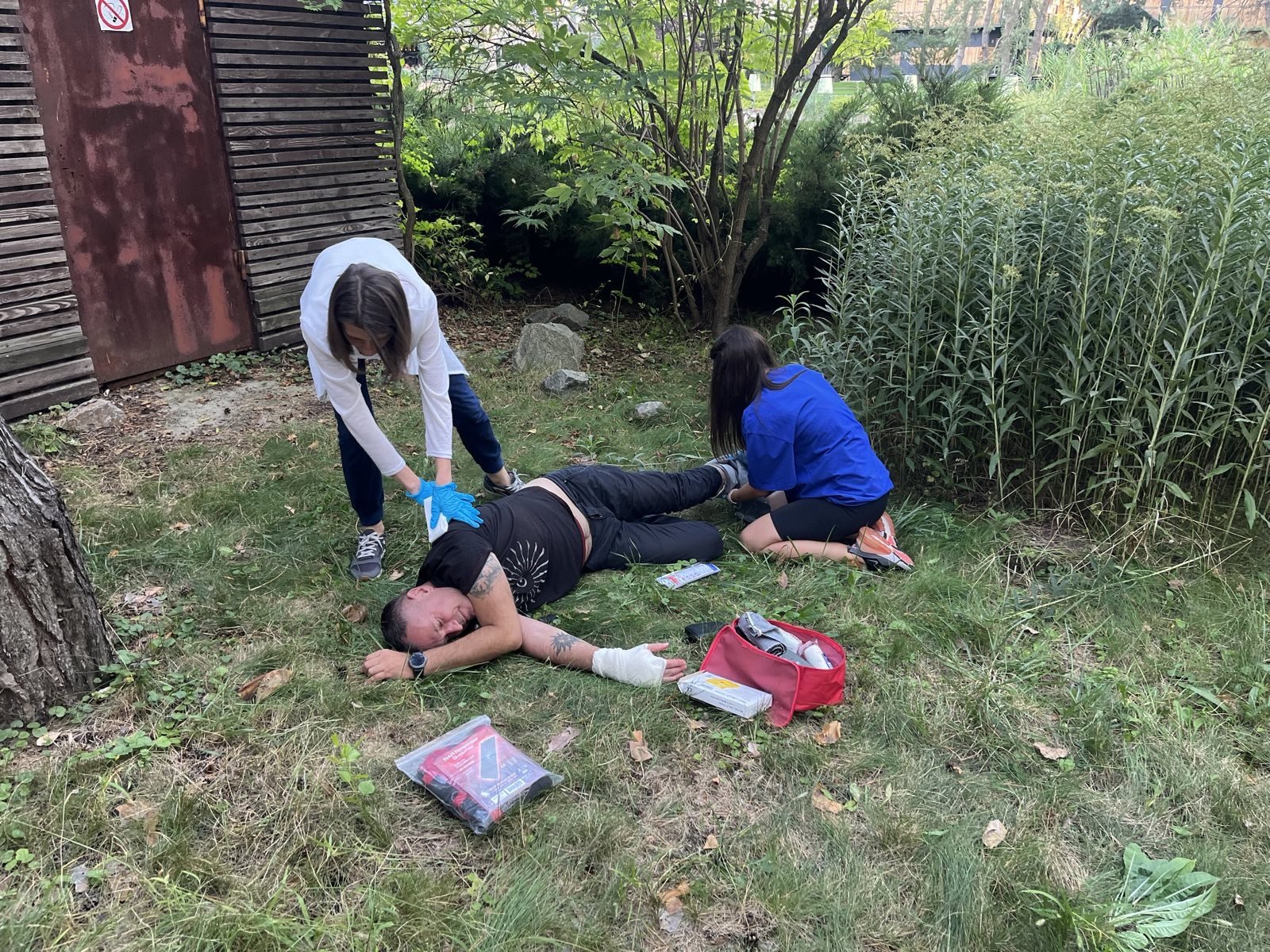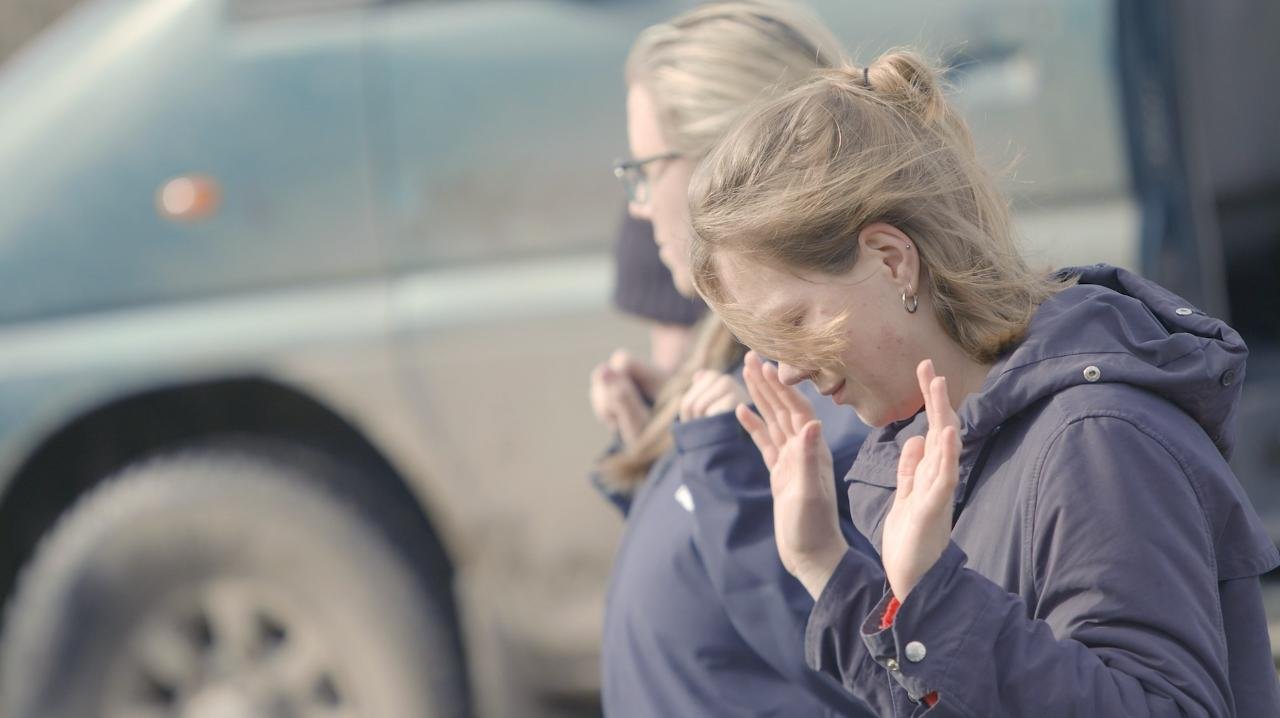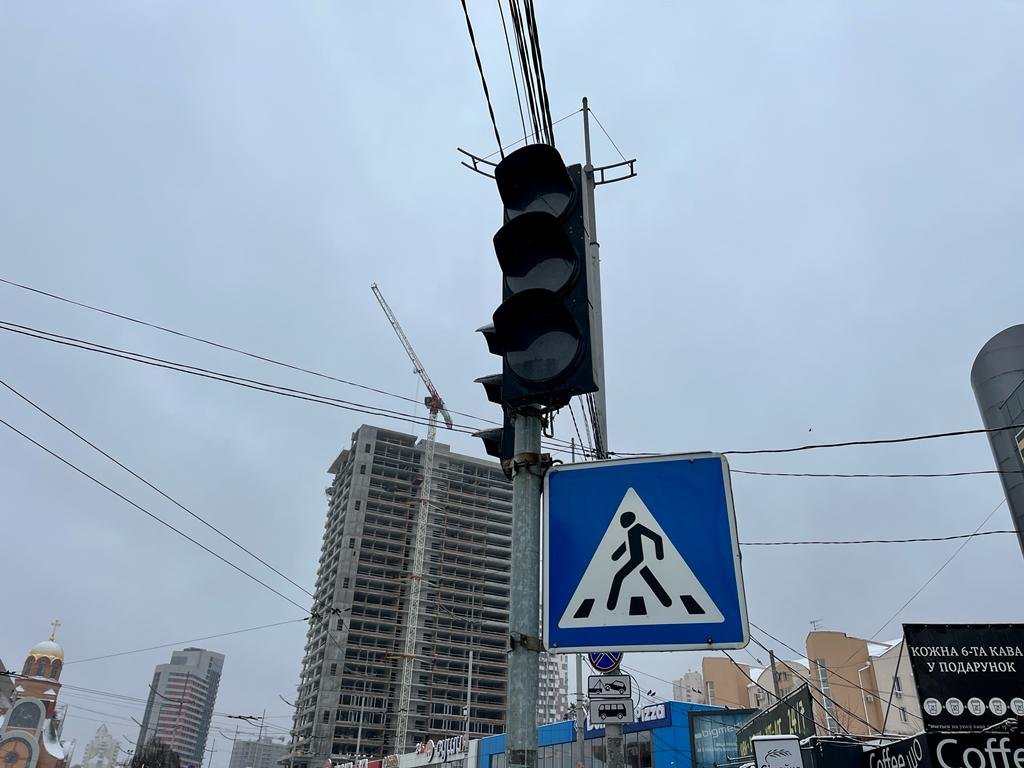Crossing the border
The first challenge was how to get there; since the closure of the air space due to the Russian invasion last February, it meant flying to as close as you can into a neighbouring country, and then choosing bus or rail links into Ukraine. I ended up plumping for a Ryanair flight to Rzeszow in Poland, then taking a train to the border town of Przemysl from where you caught a direct 9 hour train into Kyiv. Having been quizzed hard by the Polish border officials as to whether I was a volunteer fighter or not (might have been something to do with the body armour, medical supplies and satellite phone I was carrying…) I nonetheless managed to end up with all my kit intact, waiting to board the overnight Kyiv express. This was by now around 11pm, having been on the road since 9am that morning.
After a very slow 2 hour shuffle towards immigration, I was stamped out of Poland, onto the train and I was on my way. A short time later (Przemysl is only 10km from the border), the train stopped for the Ukrainian military immigration team to board. They worked their way through the carriages as the train continued to race into the night. What struck me from this first contact with their military was how young the men and women in uniform were. With no further questions or bag inspections, another passport stamp and I was officially in Ukraine.
Dawn broke across a vast expanse of green, lush scenery, the vast majority being farming land, very flat but looking extremely fertile. Spring was well underway here, and many trees and bushes were in blossom. Glimpses of large, soviet style factories and warehouses punctuated the rolling landscape, giving way to smallholdings or villages in a predominantly rural setting. The feeling that I had entered a soviet, past time took hold, it felt like a journey back in time to the USSR.
Arriving in Kyiv
I finally arrived in Kyiv around 11am the following morning, a little frazzled after a total journey time of around 24 hours door to door, Kyiv being 2 hours ahead of the UK. I met Charlie, our Country Manager on the platform, and after a short stop for a Ukrainian SIM card, we were in the car and heading to the hotel. Prior to my arrival, Charlie had conducted a number of hotel recces and the main criteria for selection was a comfortable air raid shelter! Most hotels will utilise the deepest section of their underground car parking as a designated area, and set up with chairs, beds, blankets and pillows. I chose a mid-rate international brand, due to location in the city and convenience, but there is a wide range available in Kyiv, depending on budget and preference.
Charlie was with Ivan, our local driver and we were using our own vehicle for movements around town for the week’s mission with the client. The boot was kitted out with medical, breakdown and personal protection equipment, just in case. We weren’t planning to leave Kyiv but had good options in case we need to make an inter-city trip, or even a border dash if the circumstances dictated. For communications, we has taken a number of precautions to ensure secure good communications security. Although there was very little likelihood of being targeted as a commercial security team, we weren’t taking any chances. We had radio back-ups for short distance comms should the phone network go down. We had recced the client locations and were all set for their arrival later that day.
Journey Management in Ukraine
The clients duly arrived, via a slightly longer Warsaw, Lyiv, Kyiv route on a sleeper carriage, but like me were nonetheless excited to finally be here after months of build-up and anticipation. The decision to travel for this client was quite complex. They were extremely used to travelling to other risky environments across Africa and Asia. However, they were more used to dealing with post-conflict risks, such as bad road conditions, kidnap and crime, civil unrest and the like. Kyiv presented none of these items, but the risk of air strikes loomed large in their (and our) consciousness, one that was difficult to quantify and rate. The question we kept asking ourselves was, is this a reasonable position to place the client into and were the travellers happy to commit? Was the outcome of the mission worth taking the risk for? In the end, we developed a criteria of tracking and assessing the quantity and impact of airstrikes, and setting a level of activity, below which we would all be happy for the mission to go ahead. This duly came to pass and the mission was go.
The format for the week was a typical capital city visit, early starts, meetings during the day, then a dinner somewhere local at night. We were having an initial briefing, combined with dinner in the hotel and were discussing air raids and how to handle them. Others tended to wait for signs of escalation (such as air defences being triggered, reporting of missiles in the area on Telegram channels etc). We had agreed that due to the current level of activity, we would all head to the shelter as soon as a siren sounded. We made sure everyone had the Ukrainian Alerting app on their phones, which emitted a very loud siren noise as soon as the national system was triggered. It also has country map, and you could see which areas were alerting, and how widespread the attack might be.
Of course, as soon as we had discussed this, the phones duly burst into chorus as an alert for Kyiv was triggered. Combined with the sirens on the buildings and the hotel tannoys, you were left in no doubt this was an air raid and we trooped into the basement. Rather annoyingly our meals were just about to arrive but the waiter promised to take care of this for us. A quick update to the UK team to advise them of our actions and we settled down in the shelter. The hotel has set out tables and chairs and there was a screened off area with camp beds for those longer stays we were no doubt going to encounter. Just as we started to take bets on how long we would be down there, the all clear was sounded and we headed back to the restaurant.
One thing you quickly learned about Kyiv, the siren system was extremely slick and well managed, but as soon as it was over, people got straight back to what they were doing with little delay. With sometimes three or four alerts per day, the sirens had become part of the daily routine. There was no panic or concern, just a simple grudging acknowledgment that this was now a fact of life for most Ukrainians. We got back to our tables and the waiter was as good as his word, dinner was indeed waiting for us, freshly prepared from the kitchen. I left Charlie and the clients in their slightly higher end, smarter hotel and took a short walk through the streets to my hotel.
Nightly Air Raids
Before I bedded down for the night, I prepared my grab bag. It had phone, passport, powerpack, water, torch and laptop, all my essentials within easy reach in case I had a rude awakening in the small hours. I also put some clothes within easy reach of the bed. This might all sound incredibly obvious, but when your mind is fogged at 2am in the morning, coupled with a bit of adrenalin from the thought of a Kinjal hypersonic missile strike coming in through the window, it is better to make things as simple as possible for yourself. I also studied the floorplan of the hotel on the back of my door and felt confident I could find both the lift and the stairs in the event of an emergency.
Off I drifted until – just after 2am, off went the siren. I woke with a jolt and hurriedly dressed and headed to the shelter. I was in luck, I was the first one there, so managed to find a comfortable corner on a sofa with a blanket. I set up comms with Charlie and the team (no cell coverage that deep but Wi-Fi was working) and we checked in with the UK team and advised all safe in the shelters. I checked the alert map on the app and all areas of Ukraine were red, this meant it wasn’t yet clear where the attack vector was coming from, and what the exact target was. After around 15 minutes, I heard and felt a deep rumbling, like rolling thunder – either launches from the air defence systems, or explosions from the incoming missiles! I hadn’t expected to actually hear and feel them, and I think this was surprising to most of us there. The shelter until this point was fairly lightly populated but this latest escalation brought a new influx of guests, stumbling in sheepishly with more than a few worried looks on their faces. I tried not to look too smug on my sofa but I felt you had to take the sirens seriously and this was proof of it.
More explosions were heard, around five or six in a fifteen minute period and then silence. Charlie and I were both checking various social media channels, and some video footage seemed to indicate a heavy attack from multiple directions, with many patriot missile launches. The question of how many missiles did each battery have had begun to form in my mind but I pushed it to the back of my thoughts. Surely I wouldn’t be caught out by a decisive change in attack strategy by the Russians on my first night in town?!
As time passed from that first wave there were no more explosions, and it seemed that the attack might be over; I checked the alerting app for an update. After around 1 hr and 45 mins another siren broke the silence saying the attack was over and signed off what a humorous ‘may the force be with you’. A nice touch from a slick system that had been refined over the last year and a bit of heavy use. One that I was very grateful for, not to mention a new found awe for the missile defence systems. Not a single missile had struck home and only minor damage from debris was reported.
Back to bed, now around just after 4am, the birdsong lulled me towards a troubled sleep, as I went over the last few hours and how this brought home the realities of the situation here, and what people here have been living with over the last 16 months. I didn’t have too long to pontificate, as once again the siren wailed at around 4.25am. I leapt out of bed to return to the shelter, this time modestly choosing a chair rather than the prized sofa and watched as many more people came straight down this time. We all hunkered down for the third time that night, but no more explosions or sounds were heard. Once more I found myself wondering, just exactly how many missiles does the air defence systems have? Finally, we got the all clear at just before 6am, and I emerged blinking into the early morning light.
During the Day
Charlie and I put together a sitrep for the client and took stock of the attack overnight. This had been the largest air attack of the war to date, one designed to overwhelm and destroy the Patriot missile systems that did such a magnificent job. The Russians has launched six of the much-hyped Kinzhal hypersonic missiles at the capital, supposedly impossible to defend against, as well as nine Kalibr cruise missiles and three Iskandr missiles. A total of eighteen missiles had been downed successfully, a fantastic result for the Ukrainian Military and supporting NATO forces. Although a huge success, we turned our thoughts as to what this might mean for the client mission. We took the view that last night’s alert, whilst considerable in scope and complexity was successfully mitigated by the sirens, the use of the shelter and the effectiveness of the missile defence systems.
Our advice was that with continued use of these measures, as well as limiting our foot movement to within 500 metres of the hotel when not in the vehicle would keep the risk within limits, but bottom line, it was for the clients to decide if they were comfortable staying on. We discussed this over breakfast and took the decision to go on with the mission. The UK team were also consulted and agreed, so we resumed with our plans. What we also had to take into account was not just our view here on the ground, but the perception those out of country would have on the risk, and how that might differ. In short, we had to communicate the risk and mitigation well enough for all to be happy from both perspectives.
The rest of the week fell into a routine of normal life by day, and then at least one, sometimes two or three alerts by night, necessitating more time in the shelter. I identified little idiosyncrasies of my fellow shelter dwellers, the chap who turned up with a roll mat and would properly bed down for the night once there; the ‘85 minuters’, like spectators at a football match, some people would have the knack of leaving the shelters just before the end of the alerts to beat the rush at the lifts. Whilst it became more of a routine and part and parcel of Kyiv life, what was evident of the debilitating nature of being disturbed every night and how tired it then was to resume a normal working day. By the end of the week, we were all tired and if staying longer, it is likely that we would have agreed different criteria for occupying the shelters.
Lessons Learnt
We closed out the week by saying goodbye to the clients as they took the train home on Thursday night, typically in the midst of a siren alert, but all safely boarded and then crossed back into Poland the next day. I reflected on what we did for them, it wasn’t purely security but more of a facilitation task. We had provided a driver, vehicle, body armour and medical kit, primary and back up communications. Charlie had acted as a local facilitator and made sure they got to each meeting quickly and without getting lost. If there had been a siren when away from the hotel his job was to get them to the nearest shelter without delay. Could they have done all of this themselves? Probably yes but with a lot of time and effort, not to mention a considerable amount of worry of dealing with the unknown.
Perhaps the last word should come down to insurance. The client had a lot of trouble getting effective cover for the trip. We introduced them to our own broker who was able to get them a policy, helped in part by the fact they were using us, and as a known quantity to the underwriter, it helped establish not only cover but a reasonable premium.
From a personal perspective the trip shed light on the resilience of the Ukrainian people and the measures taken to navigate challenging circumstances. I look forward to establishing Spearfish Ukraine and spending more time in this complex beautiful country.


